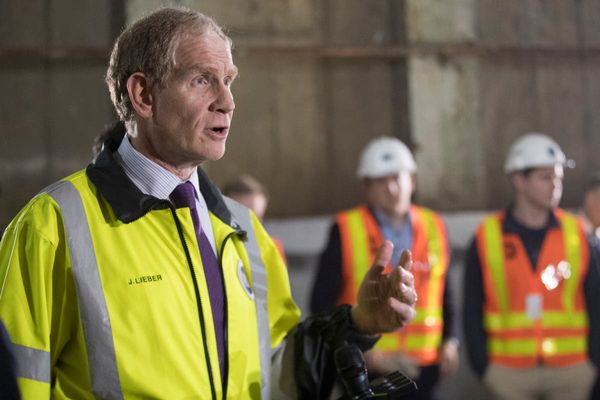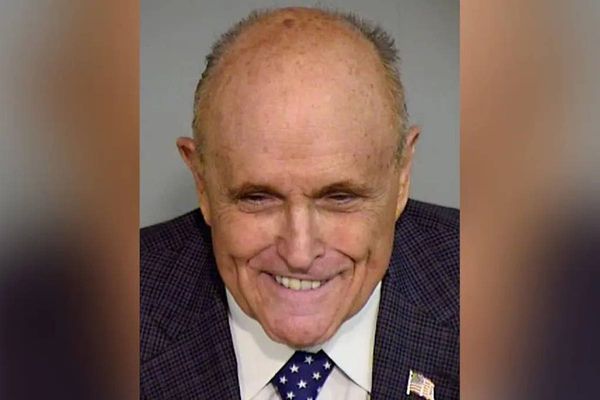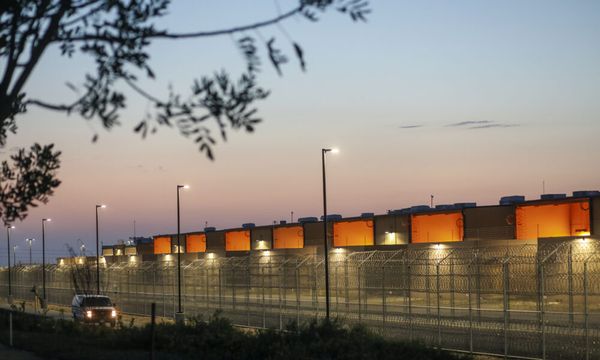
It was my hen do in the Lake District and my friends had organised a game of Mr and Mrs. The idea, for the uninitiated, is to test how well you know your future spouse. Beforehand, they quizzed Ian, my intended, and then repeated the exercise with me, with extra fizzy wine. It began with the usual stuff (Where was your first kiss? Who is the better dresser?) but then they asked a question that suddenly sobered me up: “What is your greatest fear?”
I wondered whether to answer honestly. I instinctively knew the truth but was aware it might kill the vibe. I went for it anyway. “Not being able to have children,” I said. There was a momentary hush before one of the hens played a video of Ian guessing the rather more sweeping “Failure”, and someone filled my glass to the brim. I was 36.
Several years in to trying and failing to have children, that game of Mr and Mrs sometimes haunted me. There are all sorts of complicated and sometimes illogical feelings that come with infertility. For me, shame was one. I felt ashamed that I had never hidden my desire to have children – I used to claim I would have four – and was embarrassed that it wasn’t working out.
I was a person who got what she wanted by putting in the hours. I had been ludicrously motivated from a young age, certain early on that I wanted to be a journalist. I wrote to my local radio station at 14 and explained why no one my age listened to their programmes, my cheek rewarded with a weekly slot on Radio Lancashire beamed live from my bedroom. Later, I deliberately chose a degree I knew wouldn’t take much time (German) so I could devote myself to student journalism.
My focus paid off. I got offered a job at the Guardian when I graduated, and by 30 was working as a foreign correspondent in Berlin. I remember holding a friend’s newborn baby in the pub before flying to Germany. I always loved babies – I still do – but having my own seemed so far away. There was so much I wanted to do first.
By the time I had found the right man and it became clear that baby-making the classic way was not going to work, many of my friends were on to their second child. I started IVF at 38 when a colleague was just about to go on maternity leave, her basketball belly an everyday reminder of the fertility I lacked. Social media seemed awash with 12-week scans and delivery suite snaps, with captions extolling “the greatest love of all”. I pretended to be happy for everyone else.
I developed an intense hatred for male celebrities who became fathers in their dotage after finding much younger second wives. I began boycotting the work of an actor I previously admired when he gave an interview saying that he only had to look at his wife and she seemed to get pregnant. I resented more than ever having to be the one doing all the running in my friendships, fitting in visits around school pick-ups and nap times. In my day job as a reporter, court cases involving child neglect hit me harder than ever. How were these monsters having babies when I couldn’t?
I developed irrational habits, like watching 22 Kids and Counting, a Channel 5 series about Britain’s biggest family. The Radfords live in Morecambe, where I grew up, and Sue, the matriarch, gave birth to her 22nd child at age 45, in April 2020, when my IVF was on hold because of Covid. We had to stop watching some of our favourite programmes as they seemed to be tormenting us. I remember crying on the sofa when Jake and Amy in Brooklyn Nine-Nine started trying for a baby. Naturally, they had a happy ending. I’d gobble up magazine features about a woman’s struggles, only to find out in the penultimate paragraph that she had given birth to twins.
When I started being more open about having IVF, everything fertile people said annoyed me. The red mist would descend if they tried to tell me that having kids was only borderline worth it, that they envied my – admittedly superior – holidays and Sunday morning lie-ins with the papers. They couldn’t win because I hated their pity, too. If they tried to cheer me up by saying they had a “really good feeling” about this embryo transfer, I wanted to punch them. It is an inconvenient truth that most IVF fails. My three rounds produced 24 eggs and six decent embryos, none of which resulted in a baby.
We decided to stop in the summer of 2021. Not everyone seemed to respect our decision, imagining they were being helpful when they told us about their friends who had succeeded on the seventh try or had gone down the egg-donation route. We went on holiday to Skye the day I got the final negative pregnancy result, and I remember sobbing on a rock as I watched a seal plop into the loch followed by her many glistening babies.
Solace came in the form of Mia and Laura, two glorious hedonists 10 years our junior. They had moved to Manchester from London just before the first lockdown, and Ian had joined their band on bass. The girls, as we always call them, are married but had decided early on not to have children – they just didn’t feel that children were the key to a meaningful and worthwhile existence and didn’t fancy the day-to-day drudgery of parenting. There’s a freedom that comes from opting out of motherhood before you hit your 30s. I envied it, having wasted so much of that decade wondering if I would meet the right man in time, only to find him and then discover my ovaries were not up to the mark.
Mia and Laura were sympathetic to my pain but offered an entirely different perspective on how the second half of my life might now look. Twenty free years suddenly opened up in my calendar. Having children is a good way of not having to think about what you really want from your life. Without children, you are responsible for your own destiny. You can’t blame your thwarted dreams on the pram in the hallway.
***
Still, childlessness can feel very lonely. It shouldn’t, given half of all women in England and Wales are now childless by their 30th birthday. Just over 18% are still without kids at 45, the point at which statisticians judge the natural “childbearing years” to finish, a statistic that has remained more or less constant since the late 1950s.
I started to seek out others without children, preferring the optimism of the childfree-by-choice community over the grief of those like me. It has become fashionable to draw a distinction between the childfree and people in my predicament, referred to as “childless”. Adding “less” to most words makes them negative: hopeless, meaningless, useless. I personally prefer “childfree”, not wanting to be defined by what I do not have.

It is in search of these childfree connections that I find myself again on a plane to Berlin. This time, my destination is a natural wine shop in Neukölln, a tatty but fashionable southern suburb where I used to live, to meet a group of other women with no children. I say women, but I’m surprised to see a few men when I arrive at the meet-up organised by We Are Childfree.
Everyone is well dressed: there are directional trouser suits, architectural glasses and a lot of good hair. Everyone looks delighted to be there. Jacky, a sinologist in wire-rimmed specs, says it is “paradise – when you go outside, you’re confronted with a lot of people who think you must be a cold person, or you just don’t know what you want and you will regret it. But it’s really medicine for the soul to know it’s OK. Like, my life is supposed to go this different way.”
The brainchild of Zoë Noble, a photographer from Newcastle who has been living in Berlin since 2010, We Are Childfree began in 2017 as a photographic project to celebrate women who had chosen not to be mothers. Having never felt the urge to procreate, Noble put a callout on her blog saying she wanted to “shine a spotlight on childfree women, who are elsewhere overlooked or judged for their choices”. The idea was to take beautiful portraits and interview the women about their decision to “help to remove the stigma often attached to women who don’t plan to have kids”.
Forty strangers offered to tell their stories, and the project took off. During the pandemic, Noble and her husband, James Glazebrook, decided to devote more time and resources to building what is now Europe’s fastest-growing childfree network. Their website hosts 200 diverse stories of people living their best lives without children, usually but not always by choice, and their podcast features interviews with childfree pioneers.
It is one of an increasing number of online communities – bolstered by Reddit threads and TikTok influencers – dedicated to celebrating and supporting those without kids. They aim to reclaim the childfree identity from the stereotypes of the selfish and the pitiful, and to challenge pronatal policies and assumptions. They sell merchandise, too: baseball caps saying “Tubes tied and ready to ride”, T-shirts emblazoned with “No bun in this oven” and tote bags listing the first names of four childfree legends: “Jen & Betty & Dolly & Oprah”.
It was the inclusion of Jen – Jennifer Aniston – that piqued my interest more than the others (Betty White from The Golden Girls, plus Dolly Parton and Oprah Winfrey). In the late 1990s and early noughties, when I came of age, no one’s fertility was more debated than that of the Friends star. When Brad Pitt left her for Angelina Jolie and quickly fathered a daughter and twins, as well as adopting three other children, Aniston took on a new sobriquet in the global media: Poor Jen.
Was it via her treatment at the hands of the tabloid media that I internalised the idea that not having kids was a source of shame? It showed that you could be one of the richest, most successful actors on the planet, with the world’s best hair, but if you do not have children … Poor Jen!
It was only last year that Aniston opened up about her failed IVF treatments and how hard the years of speculation made what she called the “baby-making road”. It is so weird when people start asking about babies. It was David Miliband who first asked me if I had kids. I was interviewing him in his then constituency in South Shields. I was only about 26 and remember turning around to check that the question was directed at me. Me? Have kids? It seemed a ludicrous proposition at the time, though he was just the first of many strangers to make unsolicited inquiries about my family planning.
It now seems particularly surprising that the question came from him, given that he subsequently talked about adopting his two sons after IVF didn’t work out. Only those who have tried and failed to have children truly understand how I feel, I often think. That’s why I have a crisis of confidence on the way to the Berlin wine shop, where I rightly anticipate that everyone else will be childfree by choice.
Growing up, I didn’t have any childfree models. All the adults I knew well were someone’s parents. At the meet-up, Dorien, from the Netherlands, talks about her seven-year-old niece coming to stay: “After the weekend, she kept telling everyone, ‘I want to be like my aunt. When I have babies, I’m just going to throw them in the trash can so I don’t have to deal with them.’”
Hannah, from Portland, Oregon, talks about the influence of her childfree aunt: “She was a costume designer, she was doing these meditation retreats, she had all these amazing hobbies and was having these amazing experiences that were only possible because she didn’t have kids.”
Though Hannah is now an example for her own young nieces, the pull of pronatalism is strong. One niece has a gay teacher and was preoccupied with how he would have a baby with his boyfriend. “I guess they could get a woman and keep her to make the babies,” said the young girl, to Hannah’s horror. “They were imposing Gilead at four!”
All the evidence suggests that as women become better educated and financially independent, they choose to have fewer children. What feels new is that women are now talking about this decision and refusing to apologise or be pitied for it. The US comedian Chelsea Handler uses her Instagram account to troll parents and rightwing commentators by detailing her fabulous childfree life, which mostly seems to involve skiing and getting stoned.
Handler rejects the idea that if you don’t have children you have to use all of your extra free time productively. I remember in the aftermath of my final failed IVF round announcing plans to take a bricklaying course, write a novel, learn how to sew my own clothes. I even contemplated running for public office.
I did none of these things, and that’s OK. But the increasing number of childfree women in the world could present a huge opportunity. Ruby Warrington, author of a new book, Women Without Kids, suggests that the increasing number of childfree/childless women – what she calls the “unsung sisterhood” – could herald “the start of a new chapter in our human story”. She asks: “What if more women having more time, energy and other resources at our disposal means more women leaders in business, politics, and the arts?” It could potentially lead to a more restorative, collaborative way of running the world.
Warrington, childfree by choice, confesses to playing what she calls the “Does she have kids?” game. I am a veteran of this masochistic sport, compulsively looking up women who have caught my eye and going straight to the personal section of their Wikipedia page to see if they have kids, and then feeling bad about myself when I realise they are super-successful and a mother of four.
Some of the women at the Berlin meet-up talk about difficult childhoods. Mine was very happy. My mum was not willing to sacrifice her career as a psychiatrist to have my sister and me, but once said – long before my IVF – that her great regret was not having more children. That stuck with me and no doubt reinforced the idea that while having an interesting and well-paid job is all well and good, it is children who provide the true path to fulfilment. When I got married, I became a stepmum. Though I have worked hard to build a good relationship with my stepdaughter, I see myself not as a third parent, but an extra adult invested in her hopes and dreams.

I spent so long feeling sorry for myself over not being able to have kids that I never considered the difficulties of those determined to avoid parenthood. In Berlin, one woman recalls asking for tubal ligation when she was 18, only to be refused by a succession of physicians “because you’ll change your mind”. She was almost 30 when she finally found a doctor to perform the procedure. Don’t you think you might be missing out on a life-enhancing experience, I ask her. After all, parents are always going on about a “love like no other”. She looks at me as if I’m mad. “I think they just want us to share their misery,” she says.
Noble and Glazebrook also experienced the patriarchal arrogance of the medical establishment when Noble had to beg for a hysterectomy after suffering years of agonising fibroids. It was a different story when Glazebrook, then aged 35, asked for a vasectomy. “I just went in for a consultation, which involves the doctor asking, ‘Do you have kids?’ No. ‘Do you want kids?’ No. That was it. Not even, ‘Are you sure?’”
Lise Scott, a 41-year-old nanny to Berlin’s elite, struggled since her 20s with endometriosis, having periods so painful she would pass out. But it was only last year that she finally found a doctor to remove her uterus, with successive medics refusing to believe that she was serious about not wanting children. The fact she works with children created extra confusion. “I just know 10,000,000% that I have absolutely no desire to be a mother,” she says. “I love children. I love being around them. But it has a cap for me.”
Noble and Glazebrook say there are two main fears their members share. The first is how to cope when all their friends start having kids. Scott, like many women I speak to, says friendships have fallen by the wayside once babies arrived. Her attitude is sanguine: “That’s your loss, because I’d have been an amazing proxy auntie. Plus: free babysitting.”

The big one is what happens in later life. I worry about this, but talking to women at the meet-up gives me optimism. Amy Daroukakis, 42, a trends forecaster, sees the burgeoning community as an opportunity to develop new models of living as we age. “It’s this idea of a kinship. And that’s going to be the next definition of what family looks like, where it’s based on like-minded interests, sharing of resources.”
It feels good to be part of a pioneering generation rather than a subject of pity, but I am keen to talk to someone already in the later stages of life. I call Marcia Drut-Davis, an 80-year-old author from Long Island, New York, who in 1974 was sacked from her job as a teacher in the US after giving an interview to the news show 60 Minutes about why she did not want to have children. “It was the first time I faced what pronatalism is. I had death threats and I had to have police escort me when I spoke,” she says now.
She has written two books – Confessions of a Childfree Woman and What?! You Don’t Want Children? Understanding Rejection in the Childfree Lifestyle – and now organises regular childfree cruises. She has found a new lease of life on Instagram as @childfree_guru, where she posts things like “Fabulous dinner … And we could afford it, not having raised kids or helping grandkids.” With short white hair and immaculate makeup, she looks 15 years younger than her age, and I say so. “That’s because I have a little extra money to have injections in my face!” she says.
Her books have recently started selling again and she is in demand as a speaker and mentor. Childbearing is still praised above all else, she says. “Look at an obituary. No ‘what a wonderful human being she was, dedicated to saving the planet’. But how many children did they have? How many grandchildren? If they have great-grandchildren, nirvana!”
When we chat she is cock-a-hoop that the American actor Seth Rogen has just given an interview about why he and his wife don’t have children. He said they decided it wasn’t for them and now thinks: “Honestly, thank God we don’t have children. We get to do whatever we want.” Drut-Davis thinks he has done an immeasurable service to the childfree community.
I ask her if the prospect of dying alone worried her when she first came out as childfree. “Of course it did!” she cries. “It helped when I became aware that so many parents don’t have their children there as they age. It happened to my own husband [her third]. He and his children are estranged. Some have children of their own and can’t visit. Sometimes children predecease Mom and Dad. There’s no guarantee at all.”
What she is really passionate about is “making heart connections to younger people”. By this she means “meaningful, authentic, loving friendships” with people across the generations. “Because they’re the ones who will visit you and they’re the ones who will care.”
As we say goodbye she makes me promise that if I am ever feeling sad about not having children I’m to call her. “I’m not gonna say you are not going to struggle. You will. Pronatalism makes everything all gooey and wonderful. But, you know, little babies become teenagers. Teenagers are snarky pains in the ass. Life with a child is a 24-hour, seven-day-a-week career.” She blows me a kiss and hangs up.
I wasn’t sure joining the world of the childfree by choice was going to provide me comfort. Would these women, so certain that parenting was not for them, understand why it was what I had always wanted? Perhaps I, too, had internalised the idea that women without kids were cold and lacking in compassion, which could not be further from the truth. The “unsung sisterhood” has got my back.
As I was writing this article, a friend texts to say she is pregnant again. I tell her I am happy to hear her news, and I am. I feel a little bit sad for me, too. That both things can be true feels like progress. I think I am going to be all right.







